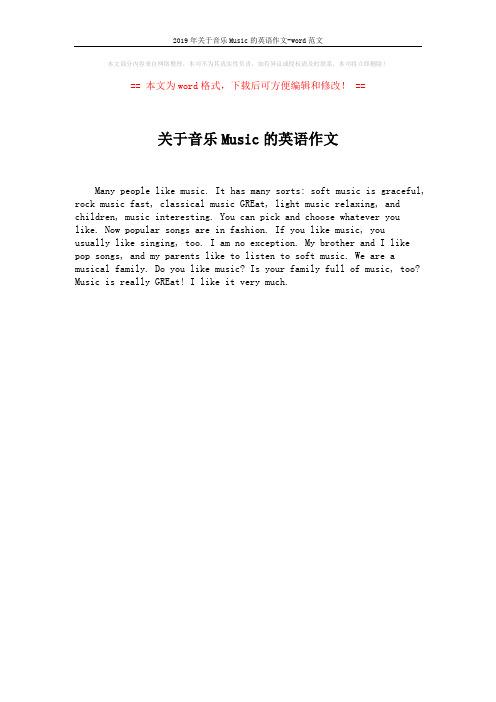英语作文素材积累
Exploring the Harmony of Music: A Journey Through English
Music, with its universal language, transcends borders, cultures, and languages. Its melodies resonate with the soul, conveying emotions, stories, and experiences that words alone sometimes fail to express. In the realm of English, the language of Shakespeare and modern communication, music serves as both a subject of study and a medium of expression. Let us embark on a journey through the harmonious fusion of music and English, exploring its multifaceted dimensions and profound impact.
1. Music as a Cultural Tapestry:

Music reflects the rich tapestry of cultures woven across the Englishspeaking world. From the folk tunes of Ireland to the blues of the American South, and from the reggae rhythms of Jamaica to the indie rock of Britain, each genre carries the essence of its cultural roots. Through English, enthusiasts delve into the lyrics, unraveling tales of love, loss, rebellion, and triumph embedded within the music. Analyzing songs provides a gateway to understanding the nuances of dialects, slang, and regional expressions, enriching language comprehension.
2. Lyrics: Poetry Set to Melody:
The marriage of lyrics and melody creates a poetic symphony that resonates with listeners. English lyrics, whether intricately crafted or spontaneously improvised, possess the power to evoke profound emotions and provoke introspection. Exploring the themes, metaphors, and rhetorical devices within song lyrics enhances language appreciation and literary analysis skills. Moreover, dissecting the subtle nuances of wordplay and double entendres fosters linguistic creativity and proficiency.
3. Musical Influence on Language Evolution:
Music serves as a catalyst for language evolution, shaping vocabulary, pronunciation, and linguistic trends. Through exposure to songs, individuals assimilate new words and phrases into their lexicon, expanding their linguistic repertoire. Additionally, musicians often introduce colloquialisms and idiomatic expressions into their lyrics, reflecting contemporary language usage. Analyzing the evolution of music genres and their impact on language provides invaluable insights into sociolinguistic dynamics and cultural shifts.
4. Music as a Tool for Language Learning:
Leveraging music as a pedagogical tool enhances language acquisition and retention. Incorporating songs into English language classrooms offers a dynamic and engaging approach to learning. By listening to music, students improve their listening comprehension, pronunciation, and intonation. Furthermore, dissecting song lyrics facilitates grammar instruction, vocabulary acquisition, and cultural exploration. Integrating music into language education fosters a holistic learning experience that nurtures linguistic proficiency and cultural competence.
5. CrossCultural Dialogue Through Music:
Music serves as a bridge that connects people across linguistic and cultural divides. In an increasingly interconnected world, Englishlanguage music serves as a common ground for crosscultural dialogue and exchange. Through music festivals, concerts, and digital platforms, individuals from diverse backgrounds come together to celebrate shared musical experiences. Engaging in discussions about music broadens perspectives, fosters empathy, and promotes intercultural understanding, transcending linguistic barriers.
6. Music Journalism and Criticism:
Music journalism provides a platform for critical discourse and cultural commentary within the Englishspeaking world. Music critics and journalists analyze songs, albums, and performances, offering insights into artistic expression and cultural significance. Through reviews, interviews, and feature articles, they contextualize music within sociopolitical, historical, and artistic frameworks. Engaging with music journalism hones analytical thinking skills, cultivates media literacy, and fosters a deeper appreciation for the interplay between music and society.
In conclusion, the fusion of music and English embodies a harmonious synergy that transcends linguistic boundaries and cultural divides. Whether through the exploration of cultural narratives, the poetic resonance of lyrics, or the dynamic interplay between language and melody, music enriches the English language experience in profound ways. By embracing music as a lens through which to engage with English, enthusiasts embark on a transformative journey of linguistic discovery and cultural immersion.










